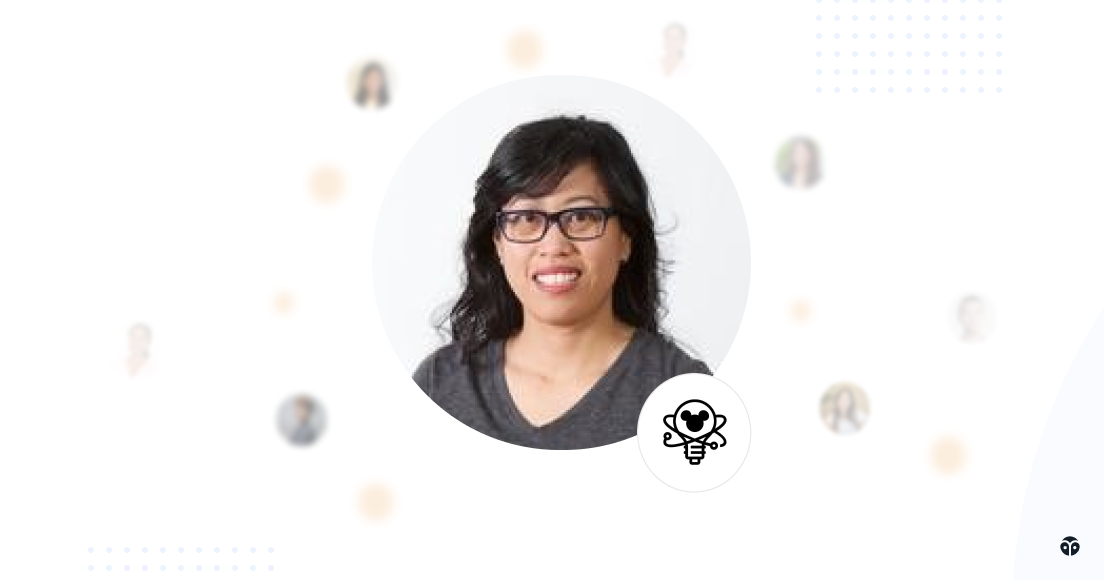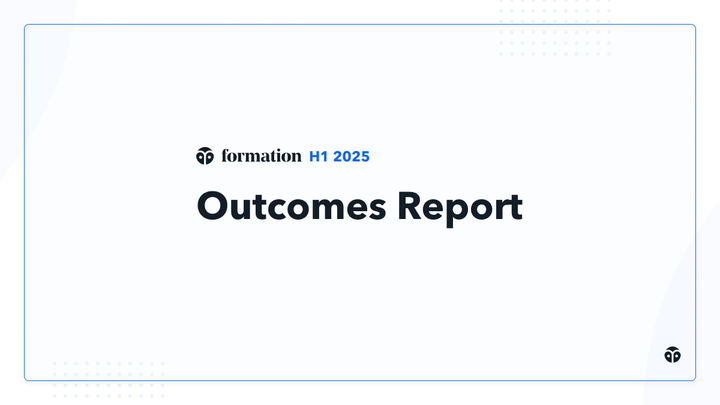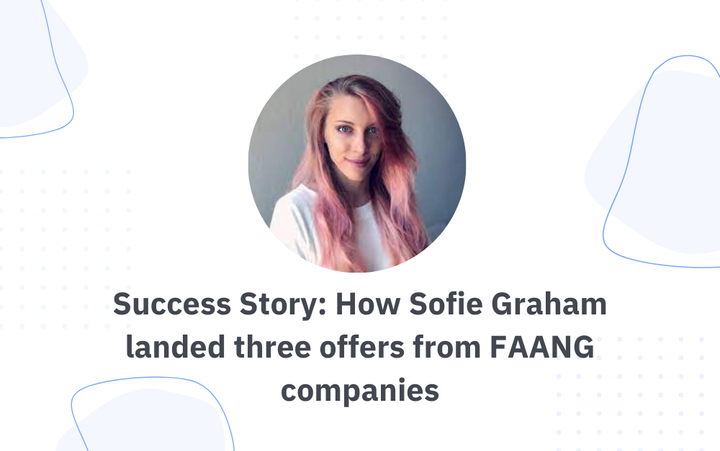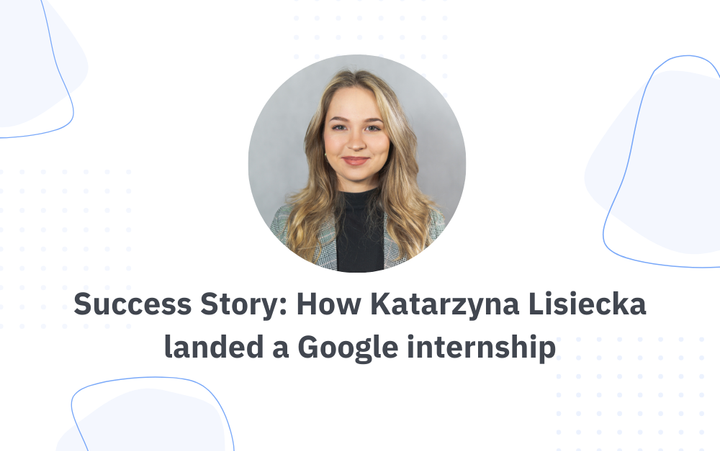Melissa Fabros: From Experienced Engineer to Senior ML Engineer at Disney
Our partnership with Women Who Code led Melissa to our Fellowship where she harnessed her engineering and interviewing skills.

Welcome to Formation’s Fellow Spotlight, a blog series designed to introduce you to former Formation Fellows who have landed their dream jobs. Today we’ll meet Melissa Fabros, a Senior Machine Learning Engineer at Disney's StudioLAB, the Walt Disney Studios' advanced development division for innovation in creative technologies. Melissa found community through Women Who Code years ago. Recently, she tapped into the same network and won a scholarship to our Fellowship through our partnership with Women Who Code. Melissa came to Formation having 5+ years of software engineering experience under her belt. Here’s Melissa’s journey from English Literature professor to Senior Machine Learning Engineer at Disney's StudioLAB.
What was your educational background prior to Formation?
I was an English Literature major in college, but I started learning about computers in middle school. Math anxiety hits girls around middle school, and that was true for me. So before I even got to high school, I kind of shut the door to the idea that I could do engineering. It just didn’t seem to be an option. And yet, in high school, I was the person who you’d ask to fix your computer or help get your website up. I didn’t have regular access to my own computer until college, so I tried every type of computer in every computer lab to experiment with what I liked because I didn’t have one at home.
I learned that instead of saying you’re “not good at something”, you can reframe it as you’re simply “beginning to learn something”—and that’s exactly what I was doing.
When did you begin to think engineering might be a viable career path?
So that spark was always there, but it was never professionalized. I was teaching at UC Merced and one of the courses I taught was Math Components to Critical Thinking Lessons. I found that using the teaching software we were given access to had bad UI. I thought the software could and should be better, but I couldn’t do anything about it. So, I started exploring tech solutions which led me to look into bootcamps and immerse myself in the tech space.
At its height, the entire Bay Area tech community was just so excited to share what they learned, and that’s when I found Women Who Code. Joining the WWC community was my first step in professionalizing the interests I had been cultivating. It was really critical to my transition into the engineering field. The community was just incredibly generous. It was really exciting and educational, and I learned how to get access to things and think in a different kind of way. I learned that instead of saying you’re “not good at something”, you can reframe it as you’re simply “beginning to learn something”—and that’s exactly what I was doing.
Sometimes the right people are there for you at the right time to learn something and it’s almost an accident, but you happen to meet the people who open a whole new world for you. For me, it was the people at Hackbright, and specifically Rachel Thomas, founder of fast.ai. I was an early student of Rachel’s, so as machine learning took off, I happened to be with the right person who believed you needed a Ph.D. to understand things—if you were having trouble understanding, it’s not that the material is too hard, it’s that the UI is bad.
After my time at Hackbright, I got a job at Kiva and helped bring machine learning to the organization. I also built out relationships with universities and won a grant to do data set work for AI. I was the principal investigator on an NSF grant at UC Boulder.
There are people and organizations who believe in more access and inclusiveness—and Women Who Code is certainly one of them. Their partnership with Formation is incredible.
What made you want to up-level your career?
I had been at Kiva for almost 5 years, and a lot of my team had already left. I needed to scale my opportunities so I was interviewing, but I was struggling. It can be really debilitating when you don’t know what you don’t know. I had an acquaintance recommend Formation and I applied through the Women Who Code scholarship. Women Who Code has been critical in helping me advance my career options. There are people and organizations who believe in more access and inclusiveness—and Women Who Code is certainly one of them. Their partnership with Formation is incredible.
What other kinds of training did you consider, and why did you end up choosing Formation?
I had researched other options and didn’t like the structure of the interview prep-style companies. I needed structure and a community rather than pure self-study. I thought about hiring a tutor, but I find that I work better with community-style learning that isn’t too micromanage-y. Formation checked all the boxes for me.
The communities developed within the Fellow Resource Groups help fight the alienation of pure self-study. I also met so many different types of people during pair learning sessions.
What was your specific goal in becoming a Fellow?
I had just washed out of the Facebook interview and was feeling really bad about that. I was doing some amount of self-study, and I was completing Stanford's AI course—yet I couldn’t traverse a linked list! I had these weird gaps in knowledge that I knew I needed help with. Formation understands that people from nontraditional backgrounds have the competency and capability to be great engineers, and they help them fill in their knowledge gaps without shaming them.
What did you think of the Formation platform and community?
Each team at Formation essentially has a PM to keep everything on track, which was great. The Roadmap gives you a self-study learning experience that is also guided where you’d want it to be. It was a really good balance that I found intriguing! The communities developed within the Fellow Resource Groups help fight the alienation of pure self-study. I also met so many different types of people during pair learning sessions. Formation is cultivating a really diverse and inclusive pool of talent.
Formation was unlike any of the other programs I’ve seen. They give you the opportunity to outline problems, practice interviewing, and articulate yourself weekly in different types of scenarios so that you can basically do these things in your sleep.
What was one thing that you found particularly valuable in the Fellowship?
Gaining mastery means you’re failing in supportive environments over and over again, but you’re given the time and space to fail and pick yourself up. When you’re actually interviewing with a company, you can only do that so many times, and it's high stakes every time. So Formation provides a framework to go through that same process where the stakes aren't that high and there are more and more opportunities to fail and try again. In that way, Formation was unlike any of the other programs I’ve seen. They give you the opportunity to outline problems, practice interviewing, and articulate yourself weekly in different types of scenarios so that you can basically do these things in your sleep.
The Mentors are honest and supportive of your growth—that is truly a gift that they give the Fellows.
What was it like training with the Mentors?
I did horrible on every single algo workout— I think I felt ready once. But the Mentors were so straight with you! They give you feedback and, even if it hurts, it’s honest and helps you become a better engineer. They made me want to improve so that the next time we met, I would be able to show them I could do it. The Mentors are honest and supportive of your growth—that is truly a gift that they give the Fellows.
How did your interview skills improve with your Formation training? I actually felt ready to interview! The negotiation and career advice from Heather Morgan was top-notch; she helped me understand how to ask for more as a woman. I’ve taken a negotiation class before so I already knew I wasn’t good at it, but I knew enough to do the research and Heather helped me be brave in asking. She helped me see that, at the end of the day, your salary is an emotionally charged thing for you but just a numbers thing for HR. With Heather’s help, I realized that there’s no hubris in asking for more, so I was able to diffuse all that self-angst around understanding what my needs are and overcame a bit of imposter syndrome.
What is your new role?
Senior Machine Learning Engineer at Disney's StudioLAB
“Quick-Fire” Questions
First code you shipped?
I changed the colors on my MySpace
Favorite “Lunch and Learn”?
Kent Beck. I won a copy of his book, too!
Formation really challenges you to understand how you feel about your sense of mastery before you move on.
Favorite group session?
I loved our team's happy hours; I taught everyone how to play Dominion and so that’s what we did. I also liked some of the algo workouts where you and some peers are working on a problem together and you create this nice synergy. It’s good to see how other people think about problems.
Biggest surprise about Formation?
That they champion supportiveness and individualized attention over competitiveness. In reality, there are enough jobs for everyone. The way you’re trained in school, it’s zero-sum; you’re trained to beat out the next person. Everyone in Formation, on the other hand, very much has the mindset of, “We’re all in this together—the more of us out there in the world, the better.” In CS courses I’ve taken in the past, it’s all about performance against a bar and each other, how many extra points you get, etc. Formation really challenges you to understand how you feel about your sense of mastery before you move on. My Fellow Manager, Ashley, was always really good at reminding me that the whole goal of being in the Fellowship is to get into the next right position for yourself, and that’s exactly what I did.
Want to level up your career like Melissa? Join likeminded engineers and get access to your personalized interview prep roadmap and unlimited technical mentorship by applying to our Fellowship today.



